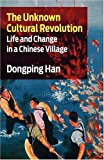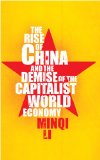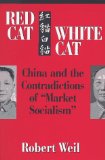Articles tagged with: cultural_revolution
CSG Articles »
I take it that this occasion on the 40th anniversary of the Cultural Revolution is not a commemoration-which would distance it too far into the past to have any relevance to the present, or a celebration-which would bring it too close to the present as if it might be directly relevant, but an opportunity to reflect on an event of great historical significance, which raised questions which may be as relevant as ever, and perhaps more so than they ever have been. I would like to take this opportunity to …
CSG Articles »
今年是文化大革命发动40周年,仇视和歌颂文化大革命的双方都在纪念。文革结束以来,似乎一切以经济建设为中心了,似乎大家都不谈文革了。但是,文革仍然是中国各级政治舞台上各色人物的最刻骨铭心的经历,仍然是政治事件和决策背后最深层的动因
CSG Articles »
This essay was prepared for the June 9-10, 2006 Hong Kong Conference: “The Fortieth Anniversary: Rethinking the Genealogy and Legacy of the Cultural Revolution” sponsored by the China Study Group, Monthly Review, and the Contemporary China Research Center of City University of Hong Kong. It was translated from the French by Shane Mage.
CSG Articles »
Introduction
The Great Proletarian Cultural Revolution (GPCR) in China from 1966-69 came at a time when the patriotic and democratic mass movement in the Philippines had stirred back to life and was gaining new-found vitality. This resurgent mass movement was in the form of a national democratic revolution that drew inspiration from the victorious Chinese new democratic revolution .
Like pre-1949 China, post-war Philippine society was semi-feudal and semi-colonial. The big compradors and big landlord classes dominated the backward, agrarian, pre-industrial economy. The Philippines was granted nominal independence …
CSG Articles »
This paper is part of a larger work in progress, my dissertation, on the influence of the Chinese Cultural Revolution in Latin America, using case studies from Mexico, Peru and Bolivia in addition to doing a broad overview of the continent. In this paper, I'll use examples from my Mexican case study to talk about the impact of the Cultural Revolution in Latin America. I've chosen to focus on Mexico because Mexico is, in my opinion, a good representative example for the development of Maoism in Latin America. It's not …
CSG Articles »
The Communist Party of China (CPC) took the leadership of fighting against revisionism after the conclusion of the 20th Congress of the Communist Party of the Soviet Union (CPSU) in 1956. Therefore, in order for us to understand the impact of China's Cultural Revolution on the international communist movement, we have to understand the CPC's anti-revisionist struggles during the ten years before the Cultural Revolution.
Part one of this essay will discuss the major issues regarding revisionism by reviewing the exchanges between the CPSU and CPC during most of this …
CSG Articles »
Ever since Deng Xiaoping introduced the so called economic reform in the early 1980s, corruption has been a big problem in China. More interestingly, corruption spreading like a prairie fire seems unstoppable or coming down like an avalanche threatens to overwhelm the state and the Communist Party. As the popular saying in China: bufanfubai, jiuyao wangguo, fanfubai jiuhui wangdang.(Without a campaign to oppose corruption, the state will be lost, but with a campaign the party will be lost.) would suggest. The government's harsh measures, including …
CSG Articles »
The Cultural Revolution was the culmination of Mao Zedong's efforts to find an effective means to implement “mass supervision†over officials of the Chinese Communist Party. Before the Cultural Revolution, these efforts had typically involved top-down mobilization by the party and mass organizations under its leadership. Local union leaders (and employee representative congresses they convened) were nominally supposed to mobilize supervision by employees over work unit party leaders, but their ability to do so was fundamentally limited because they operated under the direct leadership of the unit party committee. The …
CSG Articles »
A Preliminary Analysis of the Cultural Revolution Experience
The emergence of numerous independent mass organizations across China during the first years of the Cultural Revolution was Mao's critical innovation in socialist governance. It enabled the working class and its allies to supervise the existing power structure at all levels of society and defend its socialist nature. The emergence of these independent mass organizations greatly enhanced socialist democracy, i.e. a democracy based on the supremacy of the proletarian class interest. The existence of these independent mass organizations severely constrained the freedom of …
CSG Articles »
6月9日至10日,在美国的「中国研究小组」(China Study Group)与美国 Monthly Review杂志合办「四十年回顾:重新思考文革的历程和遗产」国际研讨会,于香港城市大学举行,邀请了中国两岸与美洲、亚洲的各地人士与会。文革时为河南大学生造反派的晨明先生在会上发表的这篇论文,深刻阐述了造反派的观点,值得一读。-编者




